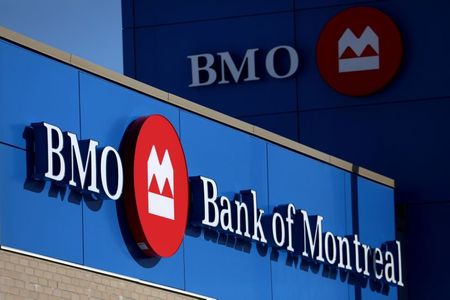TORONTO (Reuters) -Bank of Montreal (BMO) closed out Canadian banks’ results season with better-than-expected fourth-quarter earnings on Friday, and announced the industry’s biggest dividend increases and share buyback.
Canada’s fourth-largest lender said adjusted profit rose 38%from a year earlier, beating estimates on lower-than-expected loan-loss provisions and expenses, with higher income from a year ago in all its major businesses offering a boost. It said it would increase its dividend by 25% to C$1.33 and would buy back up to 22.5 million, or 3.5%, of outstanding shares.
Canada’s Big Six lenders on average this week raised their dividends by 15% and announced plans to repurchase up to 160 million shares, equivalent to 2.7% of outstanding stock after the country’s financial regulator lifted a nearly two-year moratorium.
Banks’ results have been a mixed bag, with Bank of Nova Scotia, Toronto-Dominion Bank and BMO beating expectations, while Royal Bank of Canada, Canadian Imperial Bank of Commerce and National Bank of Canada missed.
All were buffeted by rising expenses, margin pressures and lackluster trading revenues, but some managed to eke out better-than-expected net interest income growth while benefiting from industry-wide increases in fee revenues.
The industry’s costs for performance-based compensation for fiscal 2021, which ended Oct. 31, jumped 18%, a significant increase from previous years, driven by strong growth in capital markets and wealth management businesses.
BMO shares jumped 2.5% in morning trading in Toronto, compared with a 0.8% decline in the Toronto Stock Exchange’s S&P/TSX composite index. The banking subindex is up 0.3% since the earnings season began, beating a 2.65% decline in the broader benchmark.
Many of the Canadian banks’ chief executive officers sounded optimistic notes for fiscal 2022 earnings growth, particularly on the boon to struggling margins offered by expected interest rate increases. But they also expressed caution about the uncertainties presented by the emergence of new COVID-19 variants, and supply and labor shortages.
BMO is “closely monitoring” inflation and interest rate drivers, including supply and labor shortages and energy prices, BMO CEO Darryl White said on a call with analysts.
For fiscal 2022, BMO expects a mid-single-digit increase in adjusted pre-provision, pre-tax earnings, which rose 12% on a year-on-year basis, executives said. They added that results would benefit from loan growth in the high single digits, excluding the impact of the U.S. Paycheck Protection Program, which was a U.S. government loan program to help businesses during the COVID-19 pandemic.
BMO expects its net interest margin excluding trading, which fell slightly to 1.66% from the prior quarter, to remain stable in fiscal 2022, and increase if interest rates rise faster than expected. It expects costs to remain flat.
BMO recovered loan-loss provisions of C$126 million ($98.19 million) in the three months ended Oct. 31.
($1 = 1.2832 Canadian dollars)
(Reporting By Mehnaz Yasmin in Bengaluru and Nichola Saminather in Toronto; Editing by Shailesh Kuber, Carmel Crimmins, Susan Fenton and Paul Simao)







